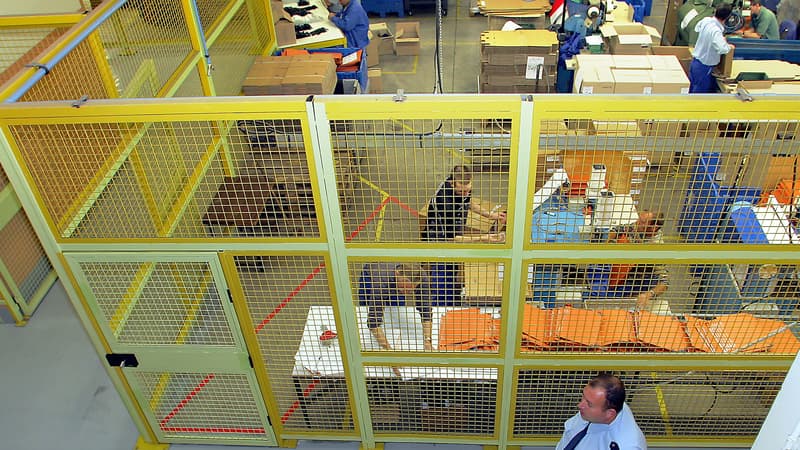Employees don’t like each other very much. In France, around 30% of prisoners work in prison. The majority are direct employees of the prison administration to carry out tasks within the establishments (cleaning, laundry, repairs, etc.). More rarely, some are employees of external companies who come to set up a workshop within these very secure walls.
Prison work is a powerful lever for reintegration and, therefore, for reducing recidivism. Problem: the waiting list of prisoners who want to work is much longer than the number of open positions.
So the Department of Justice had a pretty original idea. He recruited 10 sellers from the private sector, with the aim of approaching companies.
“We did not have these commercial and prospecting capabilities internally, so we looked at large companies,” explains Chloé Cahuzac, deputy director of the employment department at Atigip (agency for community work and professional integration of people under the control of the law) during a round table organized by the Association of Social Information Journalists on October 8.
rather industrial SMEs
The prison also contacted business organizations such as Medef and CPME. It is also present at a certain number of economic fairs such as that of made in France. Always with the same objective, to get more and more companies to go beyond the prison walls.
Currently, 400 companies work in collaboration with the prison and employ 20,000 inmates each month. These are mainly SMEs (small and medium-sized companies) or companies that are just starting their activity.
“Historically, there was a majority of companies in the packaging and packaging sector. Since then, we have tried to attract different sectors of activity, especially in industry or in metal, wood, leather, sewing…”, continues the head of the Ministry of Justice.
“I lost my job because I couldn’t keep up.”
Specifically, the prison administration provides premises. Despite overcrowding in prisons, there are currently more than 20,000 m2 of space available. Then, companies come to install their machine tools there.
Except sometimes the world of business and the world of prison collide. And some associations, including the International Prison Observatory (OIP), denounce the working conditions of prisoners. “Previously they could be paid by work, for example by the number of boxes filled. Fortunately, this was prohibited, but it was replaced by a rhythm driven by companies with defined objectives,” denounces Julien Fischmeister, representative of the OIP.
“As a result, trial periods are interrupted, people tell us: ‘I lost my job because I couldn’t keep up,'” he says.
The thorny question of salary
But then what drives companies to focus on prison work? The heart of the matter is remuneration. Because prisoners do not receive the same salary as traditional employees, their minimum compensation is only equal to 45% of the minimum wage (or between 20 and 33% for general prison services).
“For companies, it allows them to access cheaper labor, it is an opportunity to make work more flexible and maximize their profitability at lower costs,” laments Julien Fischmeister.
But the Ministry of Justice opposes it, citing the Italian example. “In Italy, prisoners’ salaries have been increased and this has caused a drop in the number of companies that work with prisons. In addition, we are in a fairly high range compared to other European countries,” defends Chloé Cahuzac.
According to her, this reduced salary also makes it possible to absorb the costs inherent to being in prison. “The company must adapt its production to the opening hours of the workshop, the merchandise must be inspected, time is lost in entry and exit…” he lists. “We must try to preserve an economic balance that is likely to put companies in custody.”
New rights but still blind spots
Without affecting current salaries, the Ministry of Justice has tried in recent years to better regulate prison work, bringing it closer, in certain points, to common law. Thus, since the reforms carried out in 2021 and 2022, prisoners benefit from coverage in the event of a work accident or occupational disease. Despite the low cost of labor, a system has also been established so that a quarter of prison labor corresponds to a quarter of pension contributions. Prisoners also contribute for unemployment, maternity or disability. In addition, labor inspectors now have a right of entry, meaning they are not required to announce themselves in advance.
Despite these advances, many blind spots remain. Prisoners do not have the right to paid holidays, they cannot join a union and companies must only guarantee them 10 hours of work per week (compared to 24 hours under common law).
“In addition, very often we have testimonies from prisoners who come back to us and explain that their employer changed their schedule at the last minute. Except it happened when they had a visiting room, a walk, a French lesson or a meeting with their lawyer,” explains Julien Fischmeister.
The only lifesaver
Finally, the OIP denounces prison overcrowding and the living conditions of prisoners who often live two, three or four to a cell and whose work becomes the only lifeline.
Especially since these meager incomes allow prisoners without resources to cover their basic needs. Because in prison, contrary to popular belief, you have to pay for the telephone (which is very expensive), stamps, additional food, access to television or the refrigerator…
Unfortunately, only 30 out of every 100 inmates have access to work in prison. Even if the number of jobs has increased, this proportion has only increased slightly in recent years due to prison inflation (an increasing number of prisoners).
Source: BFM TV


